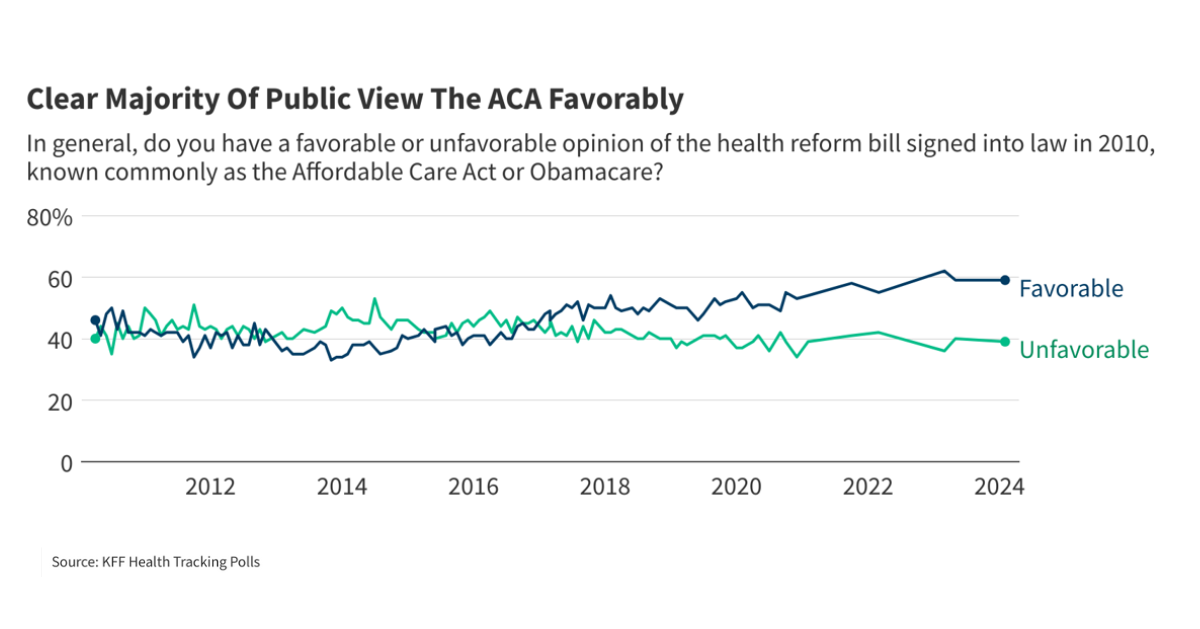Word: This useful resource was initially posted on February 22, 2024, and was most not too long ago up to date October 3, 2025, to incorporate newer polling information on the general public’s views of the ACA.
#1: Attitudes Towards the ACA Proceed to Be Extra Favorable than Unfavorable, Divided Amongst Partisans
Public opinion of the Reasonably priced Care Act (ACA) has been largely divided alongside partisan strains for the reason that legislation was handed in 2010. Following Republican efforts to repeal the ACA in the summertime of 2017, KFF Well being Monitoring Polls present an uptick in general favorability in direction of the legislation, and since then, a bigger share has held a positive than an unfavorable view. The Fall 2025 KFF Health Tracking Poll exhibits that about two-thirds U.S. adults (64%) maintain a positive opinion of the ACA whereas a couple of third (35%) maintain a damaging opinion of the legislation. Views of the ACA are nonetheless largely pushed by partisanship; about 9 in ten Democrats (94%) together with two-thirds of independents (64%) view the legislation favorably, whereas about two-thirds of Republicans (64%) maintain unfavorable views. Discover extra demographic breakdowns utilizing KFF’s interactive: The Public’s Views on the ACA.
#2: Pre-Present Situation Protections Are A few of the Extra Standard ACA Provisions
The ACA has been the topic of each authorized challenges and Congressional actions geared toward overturning the 2010 well being care legislation. Nevertheless, lots of the particular provisions included within the legislation are common and the general public would really like them to stay.
For instance, the 2020 California v. Texas case challenged the legality of the person mandate and introduced particular consideration to the legislation’s protections for folks with pre-existing medical situations. These provisions prohibit insurance coverage firms from denying protection primarily based on an individual’s medical historical past (generally known as assured subject) and prohibit insurance coverage firms from charging these with pre-existing situations extra for protection (generally known as neighborhood score). As of February 2024, two-thirds of the general public say it’s “crucial” for the assured subject (67%) and neighborhood score (65%) provisions to stay legislation, together with majorities of Democrats and independents. About half of Republicans say every of those protections for folks with pre-existing situations are “crucial.” Traditionally, majorities also say it is very important for many of the other ACA provisions to be kept in place, even when the Supreme Court docket dominated the ACA unconstitutional and not the legislation of the land.
Although majorities say it is rather essential for assured subject to stay legislation, data that this provision is a part of the ACA has dropped over the past 14 years. As of February 2024, about 4 in ten (39%) adults are conscious that the ACA prohibits insurance coverage firms from denying protection primarily based on an individual’s medical historical past, in comparison with seven in ten adults in June 2010, shortly after the ACA’s inception.
#3: Pre-Present Situation Protections Have an effect on Massive Shares of the Public
One cause why majorities throughout partisans might help the ACA’s protections for folks with pre-existing medical situations is that enormous shares of the general public, no matter age, gender, racial or ethnic identification, and earnings report having somebody with a pre-existing situation of their family. A KFF analysis estimates that 27% of adults ages 18-64 have a pre-existing situation that might have led to a denial of insurance coverage within the particular person market previous to the implementation of the ACA. An excellent bigger share of the general public believes they or somebody of their household might belong on this class. In accordance with the KFF polling information from 2020, about half of the general public say they or somebody of their family suffers from a pre-existing medical situation, reminiscent of bronchial asthma, diabetes, or hypertension.1
#4: These Who Say the ACA Has Helped Them Cite Rising Entry
KFF polling from March 2022 exhibits a couple of quarter of the general public says the ACA has helped them and their household ultimately, whereas one in 5 say the legislation has damage them. About half of those that say the ACA helped them say permitting somebody of their household to get or preserve their well being protection has been the principle means the well being care legislation has helped them (48%, or 12% of complete adults). Three in ten say the legislation has made it simpler for them to get the well being care they want (7% of complete) and one in 5 say it has lowered the price of their well being care or medical insurance (5% of complete).
The February 2024 Health Tracking Poll additionally reveals 4 in ten (39%) adults say the ACA has made it simpler for folks like them to get medical insurance, whereas about one in 4 (23%) say it has made it harder. Nevertheless this notion varies by partisanship, as Democrats are nearly thrice as seemingly as Republicans (60% v. 22%) to say the ACA has helped them on this means.
#5: These Who Say the ACA Has Damage Them Cite Prices
Among the many one in 5 U.S. adults who say the ACA has damage them and their households, most say the legislation has elevated prices of well being care or medical insurance (59%, 12% of complete). Smaller shares say it has made it harder to entry care (22%, 5% of complete), or induced somebody of their household to lose protection (11%, 2% of complete). The excessive prices of well being care on this nation proceed to be a major burden for a lot of households.






